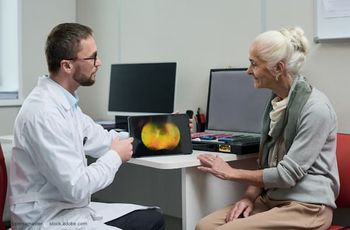
Gene-based treatment provides sustained AMD therapy
The first clinical trial of lentiviral gene therapy in ophthalmology met its primary objective, demonstrating safety and tolerability of subretinal administration of a lentiviral vector expressing anti-angiogenic proteins in patients with advanced exudative age-related macular degeneration.
Reviewed by Andreas K. Lauer, MD
Portland, OR-A novel gene-based therapy shows promise as being safe and well tolerated-with signs of clinical benefit in patients with advanced neovascular age-related macular degeneration (AMD), said Andreas K. Lauer, MD.
Such findings are from the results of a dose-escalating phase I study investigating subretinal administration of a lentiviral vector expressing endostatin and angiostatin (RetinoStat, Oxford BioMedica).
Recent:
In addition, assays of aqueous humor obtained through anterior chamber taps showed the treatment resulted in dose-dependent, significant, and persistent increases in expression of the endostatin and angiostatin genes.
“The phase I study of RetinoStat is the first clinical trial in ophthalmology investigating lentiviral gene therapy, and this construct offers a distinct advantage for the treatment of wet AMD as it has the potential for a much longer duration of effect than current therapies,” said Dr. Lauer, Kenneth C. Swan Professor of Ophthalmology and chief, Vitreoretinal Division, Casey Eye Institute, Oregon Health and Science University, Portland, OR.
Recent:
“The phase I study is also the first time therapeutic gene expression has been directly measured in an ophthalmology clinical trial,” Dr. Lauer said. “Notably, persistence of gene expression is being maintained during long-term follow-up that so far extends beyond 4 years.”
More about the study
The phase I study enrolled 21 eyes of 21 patients ages 62 to 94 years. The treatment was administered in the operating room and involved pars plana vitrectomy followed by a single subretinal injection.
Recent:
The primary objective of the study was to evaluate safety and tolerability, while biological activity was investigated as a secondary objective in these advanced patients. The study evaluated three doses of the lentiviral vector-based gene therapy. Three eyes each were treated with the lowest and medium doses, and a total of 15 eyes received the highest dose.
More retina:
Assessments for safety, tolerability, and biological activity were conducted at serial visits beginning on day 1 post-injection and extending to week 48. Subjects then entered a 15-year long-term follow-up study, which is standard for gene therapy trials conducted in the United States.
In the safety review, a total of 247 adverse events have been reported to date.
However, they were mostly non-ocular, judged unrelated to the treatment and were expected medical problems in the study’s older population. Twenty mild and three moderate adverse events were reported as related to the surgical procedure and included retinal tears/break, vitreous hemorrhage, and worsening of cataracts. There was only one serious adverse event deemed related to the surgical procedure for administration of the treatment-development of a macular hole.
Related:
Biodistribution and immune analyses conducted as part of the safety analyses found no evidence of systemic delivery of the lentiviral vector or mounting of immune responses toward the lentiviral vector. Intraocular inflammation was observed only in a few eyes in the highest dose group, but the reaction was transient and controlled with topical corticosteroid therapy. The study therefore met its primary safety endpoints.
Best-corrected visual acuity and optical coherence tomography measured central macular thickness assessed for evidence of biological activity. These were stable during follow-up to 48 weeks.
Preclinical findings
“Patients enrolled in the phase I trial had subretinal fibrosis with scarring at the center of the fovea, and so there was no expectation for vision to improve,” Dr. Lauer said. “However, to be eligible for participation, patients needed to have evidence of exudation, and at all dose levels, the treatment resulted in reduction in active leakage that correlated well with endostatin and angiostatin levels in the anterior chamber.”
The proprietary lentiviral vector platform (LentiVector) investigated in the phase I trial is engineered from the Equine Infectious Anaemia Virus and is pseudotyped with the vesicular stomatitis virus-G protein that allows entry into many cell types.
Related:
Preclinical studies, both in vitro and in vivo, demonstrated that the gene therapy transduced target cells and resulted in expression of biologically active proteins.
“In pre-clinical studies [Balaggan KS, et al. Gene Ther. 2006;13:1153-1165], the anti-angiogenic effect of the combination of proteins was found to exceed the activity of endostatin alone,” Dr. Lauer said.
The same group of investigators also showed subretinal administration of the gene therapy inhibited choroidal neovascularization in a mouse laser model of choroidal neovascularization.
More:
In addition, the gene therapy was found to be safe during follow-up of at least 6 months in rabbit and primate models [Binley K, et al. Hum Gene Ther. 2012;23:980-991].
Peter Campochiaro, MD, Wilmer Eye Institute at Johns Hopkins University, Baltimore, is principal investigator of the phase I gene therapy trial, and Elliott Sohn, MD, Department of Ophthalmology, University of Iowa, Iowa, City, is co-investigator.
More:
Andreas K. Lauer, MD
This article was adapted from Dr. Lauer’s presentation at the 2016 meeting of the Association for Research in Vision and Ophthalmology. For Dr. Lauer’s participation as principal or co-investigator in clinical trials, Oregon Health and Science University receives research support from National Institute of Health (NEI, NIDDK), Alcon Laboratories, Allergan, Applied Genetic Technologies Corp., Genentech, Oxford BioMedica, and SanofiFovea.
Newsletter
Keep your retina practice on the forefront—subscribe for expert analysis and emerging trends in retinal disease management.




























